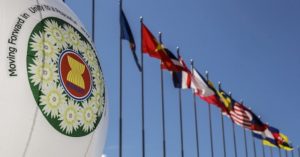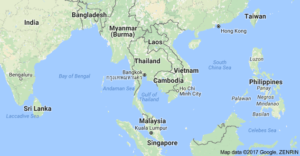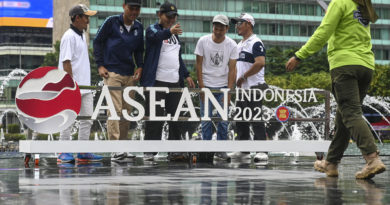ASEAN-SINGAPORE: CYBER – Singapore proposes ‘Asean Smart Cities Network’
People sit on the waterfront as sunlight shines on the Marina Bay Sands integrated resort during dusk in downtown Singapore on Aug 4, 2017. (Reuters photo)
SINGAPORE: The city-state is proposing an “Asean Smart Cities Network” aimed at improving the urban living environment and enhancing business opportunities for Southeast Asia’s 630 million people, according to a document prepared for ministerial meetings being held in the city-state this week.
For this week’s meetings of the 10-member Asean, which Singapore now chairs, Singapore has prepared a seven-page proposal that details the outlines, scope and timeline on how smart cities in the region could work.
The document says most of Asean’s growth has been, and will continue to be, driven by urban centres, with 90 million more people expected to urbanise by 2030 and “middleweight” cities of between 200,000 and 2 million residents forecast to drive 40% of the region’s growth.
However, it says, this rapid urbanisation is not without its challenges as it has implications on important issues such as city congestion, water and air quality, poverty, rising inequalities, the urban-rural divide, and citizen security and safety.
A “concept note” in that proposal says the Asean Smart Cities Network “is envisioned as a collaborative platform where up to three cities from each Asean member state including capitals — with room for expansion when it matures — work towards the common goal of smart and sustainable urban development”.
“Its primary goal will be to improve the lives of Asean citizens, using technology as an enabler. By focusing on our people, it will adopt an inclusive approach to smart city development that is respectful of human rights and fundamental freedoms as inscribed in the Asean Charter,” the note says, according to Asean sources.
“Smart cities development cuts across many sectors such as transport, water quality, energy, health care, education, public services, data, and information and communications technology. In light of cities’ often differing priorities, the ASCN will be designed to allow member cities to focus on areas that matter to them, in line with each city’s local and cultural context,” it adds.
The proposal is expected to be adopted by Asean leaders in April and official launch would be in November, after which each member city would undertake specific projects and action lines in its desired areas of focus from 2018 to 2025.
COURTESY:
The Bangkok Post
5 Feb 2018 at 20:00
WRITER: KYODO NEWS











